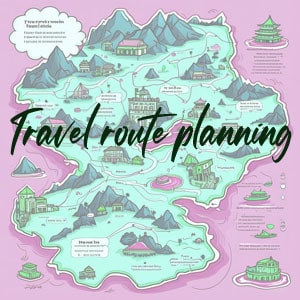Where Ancient Traditions Brew in Every Cup
In the heart of Guangzhou, tucked away from the city’s rapid urban buzz, lies Fangcun Tea Market—a sprawling, atmospheric haven for tea lovers. This is not just a place to buy tea; it’s a destination that invites exploration, interaction, and immersion into one of China’s most refined and time-honored cultural rituals.
Fangcun is the largest tea wholesale market in southern China and possibly the world. Dozens of interconnected buildings, alleyways, and arcades make up a labyrinth of tea houses, boutique shops, and storage warehouses. Each corner offers not just a product, but a story—about family traditions, regional terroirs, and the delicate artistry behind every steeped leaf.
A Living Encyclopedia of Chinese Teas
From the moment one enters the market, the aroma of aged Pu’er tea mingles with floral oolongs and roasted green teas. Visitors are welcomed by walls of neatly stacked tea cakes, shelves lined with porcelain teapots, and vendors pouring steaming cups of fragrant brews into delicate cups.
Two regional standouts dominate many tastings here: Pu’er from Yunnan and Phoenix Dancong from Guangdong’s Chaozhou region. The former is earthy and aged, prized for its evolving flavor over time. The latter is aromatic and floral, sometimes mimicking the scent of orchids or ripe mangoes, depending on the cultivar.
Many shopkeepers are eager to share their expertise. Sampling is not only encouraged—it is expected. With each tasting, vendors will explain the ideal water temperature, steeping times, and the importance of the tea vessel used. The experience is slow, contemplative, and steeped in etiquette.
Discovering the Art of Gongfu Cha
One of the most captivating aspects of Fangcun Tea Market is the opportunity to witness and learn the ceremonial preparation style known as “Gongfu Cha.”
Unlike the hurried pouring of teabags, Gongfu Cha is an art form. It involves multiple precise steps: warming the pot and cups, awakening the leaves with a rinse, controlling infusion timing to extract the perfect essence, and repeating the process across multiple rounds. Each movement is deliberate and graceful.
Sitting down for a Gongfu Cha session with a tea master reveals the philosophy that tea is not only for the palate, but also for the spirit. The act becomes a quiet ritual, cultivating mindfulness, patience, and respect.
A Market that Blends Commerce with Culture
Fangcun’s scale is impressive, yet it avoids the sterility of modern shopping complexes. Its structure is organically chaotic—some shops resemble traditional tea houses, others are minimalist studios, while a few feel like living rooms filled with tea chests, bonsai, and hand-carved furniture.
Alongside the teas themselves, there is an abundance of teaware: clay Yixing pots, celadon cups, bamboo trays, and tea pets that darken and shine with use. Many pieces are handcrafted and unique, designed to enhance not just functionality but aesthetic pleasure.
Visitors often find themselves wandering into a long conversation, learning not only about specific tea varietals but also the story behind the vendor’s family business. Several shops have been passed down through generations, and many owners take pride in sourcing directly from farmers and artisans.
Moments That Invite Participation
Fangcun is not just about observation—it invites participation. Whether you’re a seasoned tea connoisseur or a curious newcomer, there’s a place for you at the table. Vendors are used to sharing knowledge across language barriers, using demonstrations, aroma cups, and visual cues to communicate the nuances of tea appreciation.
The experience becomes even richer with a guided workshop. Some establishments offer tea blending experiences, calligraphy demonstrations, or lessons on how to recognize high-quality leaves. The slow pace of the market makes it easy to spend a whole afternoon in a single shop, sipping through a curated flight of teas while talking philosophy, tradition, and flavor profiles.
A Cultural Oasis in a Modern City
Though Guangzhou continues to modernize, Fangcun remains a sanctuary of heritage. Locals still come here to source tea for home altars, family gatherings, and personal collections. It’s also a favored destination during holidays like Chinese New Year and Mid-Autumn Festival, when gifting high-quality tea is a cherished tradition.
Surrounded by towering apartment buildings and commercial developments, the market’s weathered signs and intricate shopfronts stand as quiet guardians of a slower, more intentional way of life. The contrast only adds to its charm. It’s not uncommon to see young urban professionals sharing a tea session with elderly regulars, united by a shared appreciation for the culture.
Why the Journey is Worth It
The market offers more than a shopping trip—it provides insight into the values that shape Chinese culture: harmony, balance, community, and respect for nature. It speaks to a different rhythm of life, where a single cup of tea can inspire conversation, contemplation, and connection.
Even for those with no intention of buying, simply walking through the market is a delight. The soft clinking of teacups, the hushed murmur of appreciation, the warm fragrance of steeped leaves—all combine into a deeply sensory memory.
Getting There
Fangcun Tea Market is located in Guangzhou’s Liwan District, accessible via the Guangzhou Metro (Line 1, Fangcun Station). A short walk from the station leads directly to the main entrance, but the market itself sprawls across several streets and courtyards—it’s worth taking the time to explore. Comfortable shoes, an open mind, and a curious spirit are all you need to uncover one of Guangzhou’s most rewarding cultural experiences.

